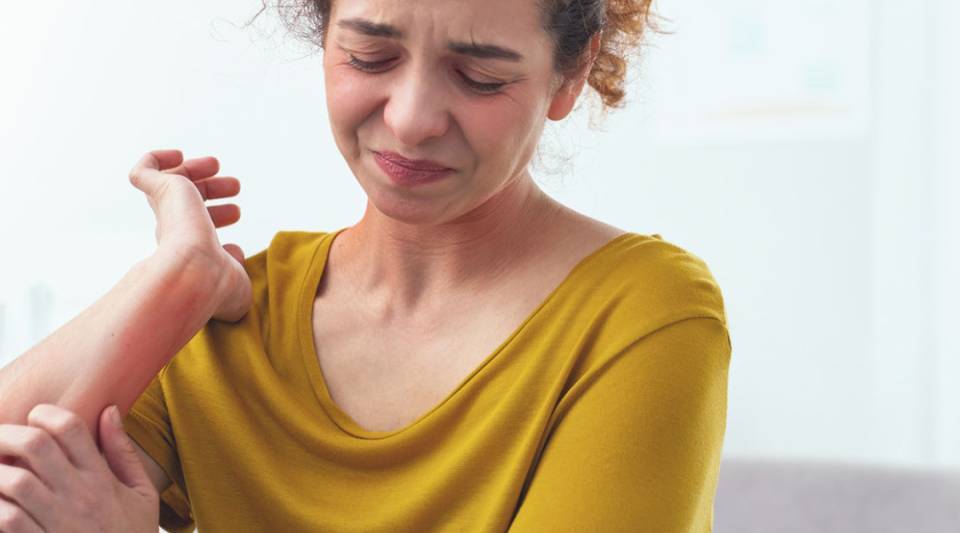Atopic dermatitis (eczema) affects around 30% of children and 10% of adults in industrialised countries. Most patients with eczema are diagnosed in childhood, but it can occasionally appear in adulthood. Too much hygiene can dry out the skin, but too little can lead to the accumulation of pathogens, irritants and allergens deposited on the epidermis.
Atopic dermatitis is a chronic, inflammatory skin disease that manifests as eczema flare-ups, when certain areas become red, swollen and itchy. When the skin does its job correctly, it acts as a barrier and protects the body from external agents, such as bacteria, viruses or irritants, while retaining water. When there is dermatitis, the skin is dry, irritated and does not protect adequately, so it is important to keep the skin barrier hydrated.
The diagnosis of atopic dermatitis is clinical; that is, red lesions are seen on the skin which the patient reports as itchy. Other tests may be performed if the healthcare professional suspects allergic contact dermatitis and considers them appropriate, such as a blood test, skin biopsy or patch tests. The latter consists of applying patches on the back with the most frequent allergens.
The most frequent complications are skin infections from the lesions, which can be aggravated by chronic scratching. Therefore, the most common sequelae are scars from scratching the lesions. Many patients also explain having sleep problems due to itching, which impacts on their quality of life. Although the disease disappears in most cases before entering adulthood, about 10% of adults continue to have it. Dermatitis has a hereditary component and can be associated with diseases such as asthma, allergic rhinoconjunctivitis and food allergies.
The treatment of eczema consists of good skin care measures and treatment of flare-ups with oral or topical corticosteroids, calcineurin inhibitors, phototherapy and potassium permanganate or oatmeal baths. In the most severe cases, oral immunosuppressants such as corticosteroids, cyclosporine A, methotrexate, azathioprine, mycophenolate and biological treatments, such as Dupilumab, are prescribed. "In recent years, new drugs have been investigated without the side effects of immunosuppressants and with a very good response, so patients can have a normal quality of life, practically the same as the rest of the population," comments Dr Sara Gómez, dermatologist at the Hospital Clínic.
Patients with eczema should avoid factors that cause it and take special care when showering. It is more harmful to shower or bathe without following certain guidelines than to do so many times. The most appropriate routine and products have to be decided with the specialist in each case, but the National Eczema Association recommends the following:
- Bathing or showering with lukewarm water (30-33ºC) to hydrate the skin for no more than 10 minutes.
- Soap-free products that clean the skin. Soap removes the natural fat (lipid layer) from skin, leaving it unprotected, so syndet (synthetic detergent), soap-free shower gels are a good alternative.
- Avoiding products that contain ingredients such as alcohol, solvents, perfume, fragrances and/or dyes to avoid allergic contact dermatitis.
- Not rubbing the skin while cleaning, but to dab it dry.
- Applying moisturiser preferably for atopic skin when damp after bathing, and as many other times as necessary (1-2 times a day).
Other recommendations to improve symptoms:
- Avoid spicy, acidic foods and alcoholic beverages.
- Avoid stress.
- Moderate physical exercise and hot baths or environments.
- Wearing cotton clothing, while avoiding acrylic, wool or plastic-coated fabrics. Not wearing too much or tight clothing.
- Not using softeners when washing clothes, as they can block the cotton fabric pores and, therefore, prevent perspiration.
- Avoiding smoking indoors, as smoke can irritate the skin.
- Prudent exposure to sun while wearing photoprotection can improve the symptoms
- The cold soothes itching. Leaving thermal water spray or spray creams in the fridge before applying them.
- Avoiding scratching and keeping nails clean and short.
- Avoiding possible environmental allergens: e.g., dust, animals and plants.
INFORMATION DOCUMENTED BY:
Dr. Paula Ribó, allergist at Hospital Clínic and member of the Clinical and Experimental Respiratory Immunoallergy group (IRCE) of the IDIBAPS.






